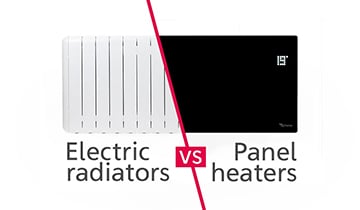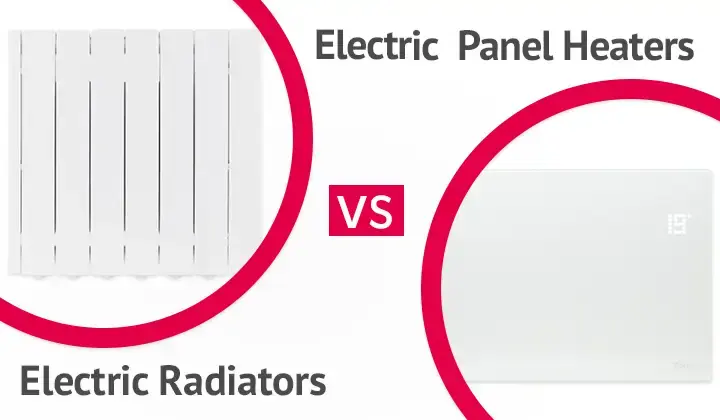5 min read
What’s the difference between electric radiators and panel heaters?
In this blog we run through the difference between electric radiators and panel heaters. If you are thinking about giving your home heating a bit of...

If you are considering electric radiators as a heating option for your renovation or new build project, then you’re probably thinking about what is the best one to buy. The electric radiator best suited to your project will be influenced by a number of factors such as the budget available and the size of the living space. More importantly, however, is how energy-efficient the electric radiator is.
Why?
Well, the less energy-efficient the electric radiator, the more it will cost to run. So, even if a particular model has a low-cost initially, the running cost of it could spiral out of control if it has poor efficiency.
In this article we will walk you through what you need to look for when buying energy-efficient electric radiators for your project, which in the long-run will be the best choice you could make.
When choosing an electric radiator you need to make sure that you select the right size with the right output for the space you plan to install it in. For example, 500W or 2,000W. However, there are also a variety of factors that will influence the output that you need, such as:
• Size of room
• Number of exterior walls
• Number or windows and doors
It sounds complicated, doesn’t it? But there are simple and useful tools to help calculate the output that you need. One of which is calculating the BTU.
What does BTU stand for?
The British Thermal Unit (BTU) is a common measure of the heat a radiator with emit into the room. If the BTU is too low, the space will not heat efficiently. To calculate the BTU, you will need to measure the length, width and height of the room and consider windows and patio doors.
If you know the output (watts) of the radiator, simply multiply that by 3.41 to get the BTU/hr and if you have the BTU, you can divide it by 3.41 to get the watts or output you need.
For example, if the output of the electric radiator is 2,000W then the BTU/hr would be 6,820:
2,000(W) x 3.41 = 6,820 (BTU/hr)
You can find free BTU calculators online such as the B&Q BTU Calculator and Mr Central Heating.
After you have completed the calculations that you need and it works out to be in between two wattages, always choose the higher wattage. Modern and good quality electric radiators come with a built-in sensor which means that it will generate enough heat to maintain your desired temperature of the room. It will then switch off, once it’s reached which doesn’t waste energy.
Build quality
The best performing electric radiators are ones where the body is made completely from aluminium which conducts heat brilliantly and lightweight. This means it will heat up much faster than non-aluminium body versions. As well as aluminium, electric radiators with a galvanised steel body that have been finished with a powder coating are a solid option too.
Some models of electric radiators include interchangeable electronics which makes replacing faulty parts easier even if the radiator falls out of the warranty.
Heat generation
Electric radiators generate about two thirds of their heat by convection (heating the surrounding air) and the other third by radiation (heating objects and people directly). They are either filled with a thermal fluid such as oil or a dry element like a ceramic core which stores the heat. It is because of this that electric radiators are deemed more energy efficient than others such as panel heaters, which rely on convection alone.
Controllability
Being able to accurately control and programme your electric radiator is a must have to ensure energy efficiency is maintained. Electric radiators with inbuilt digital thermostats are known for accuracy. Looking at the technical specification of an electric radiator you’ll find information on how accurate the thermostat is. For example, ‘accurate to +0.3oC’ or ‘accurate to +0.8oC’. The lower the number, the more accurate the thermostat.
Energy monitoring
As the cost of energy has risen, it wouldn’t be unfair to say that we are becoming a lot more conscious of tracking our energy use. Electric radiators with an energy monitoring function will help you to identify opportunities to improve your energy use. For example, if one of the electric radiators in a room is using more energy, it could highlight an area of poor insulation or that’s susceptible to a draft.
Adaptive start
This is a clever piece of technology which balances temperature control with minimal energy consumption. An electric radiator with this functionality will learn what the best time is to pre-heat the room so it reaches the programmed temperature at exactly the right time.
For example, if you want your living room to be measuring 19oC at 6pm as soon as you arrive back home it will do with adaptive start. Electric radiators without it, will only start to warm the room from 6pm, or you will need to take a guess at how much earlier you need to set the program in order to have it warm when you arrive home.
Open window detection
An electric radiator with open window detection will help reduce wasted energy by heating rooms where a window or door has been left open. If it senses a drop in temperature, it will go in ‘standby mode’ until, so energy is not wasted trying to compensate for the sudden drop in temperature.
The simple answer is yes! As they are electric, there’s no requirement to connect them to any pipework which keeps the installation cost to a bare minimum. You’ll find that most electric radiators can simply be plugged into a standard 3 pin socket. If you want to move or add any sockets to accommodate your new plug-in electric radiator you’ll need a qualified electrician to do that for you.
What about maintenance?
Electric radiators do not require any maintenance apart from dusting occasionally. Why? Because they are not connected to a combustible fuel (gas) and don’t contain moving parts which saves you money on any annual maintenance.
If you are still unsure if electric radiators are right for your project, see how they compare with electric panel heaters (like the Glass Panel Heater), by reading this useful article ‘What’s the difference between electric radiators and panel heaters?’
However, if you’ve decided that an electric radiator is perfect for your project, then ThermoSphere’s Oil Filled Radiator would be a serious contender.
If you have a question about anything covered in this article, please contact one of the ThermoSphere team who will be happy to help.

5 min read
In this blog we run through the difference between electric radiators and panel heaters. If you are thinking about giving your home heating a bit of...

18 min read
If you’re in the process of looking into installing electric radiators or panel heaters for your next project, this article could be just the thing...
.jpg)
8 min read
Electric heating has been on the march for a while now, but in 2025 it’s no longer the quirky alternative—it’s mainstream. More and more homeowners...